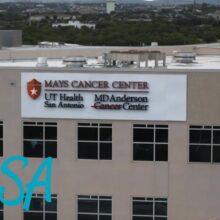Thinking about weight loss surgery? Meet two Atlanta surgeons with top results.
DR SCOTT STEINBERG >> Hi, I'm Dr. Scott Steinberg. I'm the medical director of bariatric surgery
at Emory Decatur Hospital. Along with my partner, Dr. Rashid, we have
performed thousands of laparoscopic and robotic weight loss operations. DR QAMMAR RASHID>> Hello. I'm Dr. Rashid of the comprehensive weight
loss center at Emory Decatur Hospital. Our nurses, anesthesiologists and many of
the professionals on our team have also done this work for decades. Our program qualifies as a center of excellence
because our doctors do hundreds of these operations each year with very low complication rates. You may have been sent information about our
program from your insurance company for that reason. Our center is designed to treat a medical
condition called morbid obesity. For many years, people thought that obesity
was the patient's fault, that they just ate too much, didn't exercise enough. Morbid obesity is in fact a medical condition
with many associated comorbidities that go along with it. SARAH >> I exhausted all of my other options
before I went to surgery, but I know that after being on support groups online, that
it was the right decision for me.
STEINBERG >> Obesity is a very serious disease. Once a patient is 30 pounds or more over their
ideal body weight, they are considered to be obese. Another way to look at morbid obesity is to
use something called the BMI, or the body mass index. The way we calculate your BMI is we take your
weigh in kilograms divided by your height in meters squared. If your BMI is between 18.5 and 24.9, then
you are considered to be in the normal body range.
Once your BMI reaches 25, you are now considered
to be overweight. When your BMI reached 30, you now have obesity,
but when your BMI reaches 40, you now have a disease known as morbid obesity. Morbid obesity is associated with many different
comorbidities. For example, there are physical comorbidities,
economic comorbidities, psychological comorbidities, and there are medical comorbidities. Physical comorbidities can be as simple as
a patient having difficulty walking across a room just based on their obesity. Many of our patients are unable to fly on
an airplane or even go on a ride at an amusement park with their children due to the physical
limitations of begin morbidly obese. There are economic comorbidities that go along
with being obese. For example, in a recent article, it was demonstrated
that patients that are obese will make significantly less money than someone who is not obese just
based on their obesity and nothing to do with their educational background and work experience.
Psychological comorbidities are very commonly
associated with morbid obesity. For example, depression. Many patients that have depression take medications
that can slow their metabolism and lead to further weight gain. Also, medical problems such as sleep apnea,
high cholesterol, arthritis, heart disease, liver disease, and diseases of the gall bladder
can be associated with obesity. After weight loss surgery, almost all of these
comorbidities will either resolve or improve significantly. Many patients that are on medications to treat
diabetes will come off of all of their diabetes medication after weight loss surgery. JAMES >> Since the surgery, I was able to
throw away pretty much all of my medication for diabetes, my insulin, metformin, all my
blood pressure medication, it’s all gone. STEINBERG >> Interestingly, many patients
that are obese are at greater risk for developing certain types of cancers and after weight
loss surgery, the risk of developing cancers and the mortality rate from these cancers
drops significantly. According to the centers for disease control,
or the CDC, obesity is the second leading cause of preventable death exceeded only by
cigarette smoking, and it is projected that obesity will surpass cigarette smoking as
the leading cause of preventable death.
Once your BMI reaches 40, there's a reduction
in your life expectancy by over six and a half years, and when your BMI reaches 55,
there's a reduction in life expectancy of 13.5 years. RASHID>> The CDC tracks obesity because it's
considered an epidemic. On this map of the US going back to 1985,
you'll see that there is not a single state where obesity rates are greater than 10-14%.
As we keep going notice that not one state
is regressing. On this last slide for 2010, we see that not
a single state has less than 20% obesity. US populations are getting more and more obese
every year. If any other disease spread like this, you
could not turn on your TV without hearing about it. We have identified over 30 different genes
that lead to obesity. So if you have one of these genes your risk
of becoming obese increases no matter what you do. Also, your environment, activity level, calorie
and sugar intake as well as hormones will affect your chances of becoming obese. Our ancestors had to use lots of calories
to hunt for food in a calorically scarce environment and developed genes that allowed them to store
fat to survive.
They've passed on those genes to us, which
are no longer needed in our calorically rich environment. Modern day calories include bottomless cups
of sugar laden sodas, up sized fast foods, and more. Hormonal factors and metabolism can certainly
lead to obesity, but more than likely, it's genetics and environment at work together
here. Dieting only works on a temporary basis because
as you're losing weight, your brain says, "Nope, you forgot to eat. I'm going to make you hungry.
I'm going to make you angry. You're going to crave every food that you
shouldn't be eating because you have not eaten." It's not hard to lose weight. What's hard is to keep the weight off for
a long period of time. Diets fail for many reasons. My short answer why is that diets cause your
metabolism to slow down, your muscles to reduce its mass, and your cravings to go up. You will regain your weight plus more. Here at the center for comprehensive weight
loss, we focus on sustainable long term solutions, and that's where surgery comes in. It's very serious and needs to be well considered. VALERIE>> This has been the best decision
I could have made for myself, at my age. My energy level is through the roof, I can
keep up with my two great grandchildren, I’m so grateful for that, and I would recommend
it to anyone, any age, to do this. RASHID>> Let me give you the basics of how
your GI system works.
Your stomach is a bag of acid that breaks
your food down into smaller particles. It's not until the food goes into your small
intestine and is broken down by enzymes that you start to absorb calories. If we were to go in there, and take out all
of your small intestine, you could eat whatever you want, and you'd never gain weight. But of course, we can't do that because you
need some of your small intestine to absorb proteins, vitamins, and other important things. We can however, bypass some or a lot of your
small intestine so that after surgery you don't absorb all the calories in that food.
Then you start to lose weight. More than that, your body will not crave certain
foods and your weight set point will be lower. and your body responds by reducing your hunger. You won't want to eat a lot. So you're able to keep gradually losing that
weight, and it's extremely effective. So who is a candidate for our surgery? You have to be 100 pounds or more over the
ideal body weight, or have a BMI of 40 or greater. Alternatively, if your BMI is 35 or greater
and you have either high blood pressure, diabetes, or sleep apnea, you're also considered to
be a candidate for the surgery. the risk of surgery is much, much lower than
living with those disease states. Additionally, you need to have failed voluntary
weight loss. You wouldn't be here, though, if you hadn't.
You do need to be physically able to tolerate
the surgery, be cooperative, and informed. We have you watch this video before surgery
because there is a lot of information that's critical to the surgery's success. We want you to be part of the decision making
process. We will certainly give you our advice from
our experience, and we'll recommend what we think will be best, but your input is critical. The good news is you won't make a wrong decision
and we'll help you fine tune the best option based on our experience with thousands of
patients.
SARAH>> It is a choice that you have to make
for yourself and for your health; you’re not doing it to satisfy anyone else, other
than yourself. RASHID>> For us, the goal of surgery is very
clear. It's purpose is to improve health, quality
and length of life. This is not cosmetic surgery. You may think you look great after you lose
150 pounds, but you're mainly doing the surgery because you're tired of being on insulin,
blood pressure medicine, cholesterol medicine, sleeping with a CPAP machine, and going to
the doctor every few weeks. Your orthopedic surgeon won't fix your hip
or your knee until you lose 100 pounds. You're just tired of being exhausted. STEINBERG>> Weight loss surgery can be divided
into three different categories: restrictive, malabsorptive, and combined. Restrictive procedures restrict the amount
of food that a patient can eat. Malabsorptive procedures reduce the amount
of calories that a patient will absorb when they eat.
Malabsorptive operations can also reduce the
absorption of important nutrients. Therefore, purely malabsorptive operations
are no longer performed. The third category is known as a combined
operation. The combined operation uses restriction as
well as malabsorption. Many patients take medications that will need
to be adjusted prior to surgery. When we see you in the office in consultation,
we will thoroughly review your medical conditions and your medications and adjust them appropriately
prior to any surgical intervention. Smoking cessation is extremely important prior
to surgery. As you know, smoking can increase risk of
complications after any surgical procedure. Reduction of carbohydrate intake is also important
in order to have a successful, safe operation. RASHID>> Next, we'll talk about the pros and
cons of the three types of surgery we offer. There is a lot to explain, so this may be
a good time to take a break if you haven't already. The first type of surgery is a sleeve gastrectomy,
a wonderful restrictive procedure. A study conducted by the american society
of metabolic and bariatric surgeons, our parent organization, found that sleeve gastrectomy
patients had very low complication rates.
Results showed that five years after surgery
patients had lost about 60% of their excess weight and they kept it off. Now every insurance company including medicare
and tri care considers the sleeve gastrectomy an appropriate procedure for weight loss,
and since it's been around for so long, it's been refined and well established. In this procedure, we take away the greater
curvature of the stomach, which is the stretchy part that expands and allows us to eat big
meals like on thanksgiving. We staple it, cut it off, and take it out. We send it to the pathologist; they look at
it on the inside and make sure there are no ulcers, masses, nothing abnormal or unusual.
They send us a report and then it's gone. This makes the stomach from a football-sized
organ to a long narrow tube, about the size of a medium banana, that can hold about 6oz
of semi liquid or solid food. The pros of this are that it restricts the
amount of food that can be eaten in one setting so that fewer calories are consumed and weight
loss is accomplished. Now you're gonna say, How am I] going to be
satisfied?" You will be satisfied, because what happens
on a chemical hormonal level, when we cut the stomach, we're actually taking away tissue
that secretes the hunger hormone called ghrelin. G-H-R-E-L-I-N. Your hunger is actually controlled after the
surgery. Let's go over some of the potential issues
with the sleeve gastrectomy. First, we're operating on live tissue with
blood and blood supply.
One of the potential but rare complications
is bleeding at the surgery site. We'd never leave the operating room without
making absolutely certain that everything is what we call bone dry and there's nothing
that can bleed after surgery. Still, things can happen. A second possible complication is a staple
line leak. We do everything in our power to minimize
that leak by acting upon a lot of things before surgery, during surgery, and monitoring you
very closely after surgery.
A third consideration is that the removed
portion of your stomach is disposed of after surgery. This method is not reversible. Even though there aren't any long-term studies
yet, if you've kept the weight off for five years, chances are that you'll keep the weight
off for the rest of your life. STEINBERG>> Now, I'll go over the Roux-en-Y
gastric bypass. The Roux-en-Y gastric bypass has been around
for many, many years. This is considered to be the gold standard
for weight loss surgery. When we perform a Roux-en-Y gastric bypass,
the first thing we do is we make a very small pouch out of your stomach. Your stomach currently is about the size of
a Nerf football, and we will make it the size of a golf ball. In addition, we will be bypassing part of
your intestine and connecting part of your intestine up to that new small pouch that's
in the first part of your stomach. And then, your acid and enzymes from your
stomach and pancreas will then go down the other pathway, and they meet together in what's
called the common limb. This is where your food is absorbed.
Most patients will lose 50 to 70% of their
excess weight long term. The gastric bypass will reduce your hunger. It will also restrict the amount of food that
you can eat. Another way that the gastric bypass helps
you to lose weight by creating something known as the dumping syndrome. In patients that have a gastric bypass that
eat a lot of sweets, they will start to feel very sick and nauseated. This is only temporary, but it is a very strong
deterrent for you to eat foods like sweets. Another advantage of the gastric bypass, in
patients that have been type two diabetic for fewer than seven years, most patients
will come off of all of their diabetes medication. In addition, patients that suffer from severe
gastroesophageal reflux disease will have almost immediate resolution of this problem
following Roux-en-Y gastric bypass surgery. Some of the risks of gastric bypass surgery
include a risk of bleeding or leaking from where the intestine and the stomach have been
reattached. After gastric bypass surgery, it's very important
that you take vitamins. Our well-trained dieticians will give you
a regiment of vitamins to take so that you have long-term success and avoid serious vitamin
deficiencies following bypass surgery.
RASHID>> The last procedure that I'll talk
about is something called a loop DS. DS stands for duodenal switch. Sometimes we'll have a sleeve gastrectomy
patient who has not had enough weight loss that we can convert to a loop duodenal switch. This is a procedure that's reserved for patients
who have very high BMIs, BMIs in the mid 50's and greater. We will basically perform a sleeve gastrectomy
first and then attach your new stomach much further down to your intestines. Our loop duodenal switch method leaves double
the small intestine for absorption compared to the traditional duodenal switch, but it's
still a very small amount that's available for absorption of calories and nutrients. This is a procedure, which controls the intake
of food as well as hunger.
We don't have to implant anything. However, just like the last procedure we talked
about, the cons are that we’ve changed the anatomy of the body, there is still a small
risk of a staple line leak, it's not reversible, and it can lead to vitamin deficiencies. These are the pros and cons of a loop duodenal
switch. STEINBERG>> I would like to talk about the
lap band procedure. For many years, the lap band was very popular,
but after performing thousands of these operations, we've learned that long-term weight loss was
not as robust with the lap band. Fortunately, the lap band can be removed and
we can convert the lap band to a gastric bypass, sleeve gastrectomy, or a loop duodenal switch. Prior to having surgery, all of our patients
will be seeing a pulmonologist, psychologist, and our dietitian. In addition, we will speak with your primary
care physician, a cardiologist, and an endocrinologist as needed in order to ensure that you are
at your best prior to this very important operation. This comprehensive process may seem overwhelming,
but we have a program coordinator who will help you make appointments with a dietician,
the psychologist, the Pulmonologist, and any other physicians that you need to see prior
to having surgery.
While you're in the hospital, our dieticians
will meet with you and review all of the important information, including what liquids you will
drink after the surgery and when to start your vitamins. If you have shortness of breath, worsening
abdominal pain, nausea or vomiting, or you're just concerned about anything, do not hesitate
to call us. We will tell you exactly what to do and one
of us is always available. After weight loss surgery, it's important
to modify some of your medications. We will review these with you. It's very important that you avoid anti-inflammatories
such as Ibuprofen or Advil because these medications can increase your risk of ulcers and bleeding. We will be giving you a blood thinner in order
to reduce the risk of blood clots We will place devices on your legs during the surgery
that help circulate your blood. After your surgery, you will be observed in
the recovery room until you are determined to be ready to go to the surgical floor.
Once on our surgical floor, you will be walking
around as soon as possible. The surgery that we perform is done through
very small incisions, so the postoperative pain is minimal. This will allow you to take deep breaths in
order to reduce the risk of you developing pneumonia. On the first night in the hospital, we will
give you IV fluids, pain medicine, and nausea medicine, but nothing to eat or drink. The following morning, if everything looks
okay on your upper GI study, you will be discharged home that afternoon.
RASHID>> After surgery, you will start on
a clear liquid diet and we'll watch you as you're drinking these clear liquids to confirm
that things are going well. When you leave here the day after surgery,
you're walking, you're drinking, and you're using a very small amount of pain medicine. For the first month after surgery, you will
be on a very special diet. For the first two weeks after surgery, you're
on a liquid diet, drinking things like protein shakes, yogurt, broths and cream soups without
the solids.
The second two weeks, you're eating pureed
foods like soft scrambled eggs, ground chili, or re fried beans. That first month after surgery, we want to
make sure that whatever you eat goes down nicely and travels through your new stomach
without causing an obstruction without pulling on your staple line. Exercise is also extremely important. Once you go home, you better be walking.
Walk around your house, up and down the stairs
if you have them. The more you move, the lower the chance of
blood clots. We know that there is a possibility of injuries
to the additional organs in the area that we work in. The risk is very low, but still the possibility
exists. the worst case scenario is death. And that’s why by the time you go to surgery,
we know everything about you and we work as hard as we can to keep you healthy after surgery. In closing, let's remember that diet, exercise,
and weight loss medications usually do not have lasting effect on morbidly obese patients. Bariatric surgery is a viable long term solution
when it's done at a center of excellence where the risks are minimal and the follow up is
close and long term.
We here at Emory Decatur Hospital have helped
thousands of patients have a better life after weight loss surgery and we hope to do the
same for you. JAMES>> I’ve had a great experience at Emory
Decatur hospital, and I recommend anyone who’s looking into the surgery to check them out. VALERIE>> If you stick to what the doctor
tells you to do, then this, the surgery, and the whole program will work. I don’t care what age you are. SARAH>> I surpassed the Comprehensive Weight
Loss Center’s goal around month 8 or 9 after surgery. It’s been the best year of my entire life.
STEINBERG>> Thanks for taking the time to
watch this informative video. Feel free to return to it as often as you
need to or hit the rewind button now. Next steps for you will be to set up a one
on one appointment with either me or Dr. Rashid. Before you sit down with one of us, you'll
meet with our center's navigator. The navigator will be your guide through this
whole process, through all of the requirements of both our program and of your insurance
company. They can also connect you with our surgical
weight loss support groups, even before you've had surgery. As we've already discussed, weight loss surgery
is serious, and therefore, we would like to make sure that you are well prepared for this
journey. To get the ball rolling, click the link below
or contact our comprehensive weight loss center..






